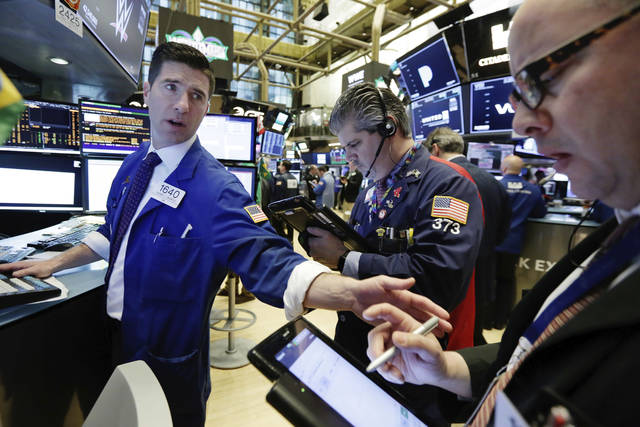NEW YORK — U.S. stocks are tumbling Monday after China raised import duties on U.S. pork, apples and other products. It’s too soon to call it the beginning of a trade war, but for now, investors aren’t sticking around to find out.
Formerly high-flying technology companies like Microsoft and Alphabet fell. Intel dove 5.7 percent following a report in Bloomberg News that Apple plans to start using its own chips in Mac computers as early as 2020, replacing Intel.
Elsewhere, Amazon sank following more broadsides from President Donald Trump on Twitter, and electric car marker Tesla gave back 4.4 percent after saying the vehicle in a fatal crash last week in California was operating on Autopilot mode, making it the latest accident to involve a semi-autonomous vehicle.
Major indexes were off their worst levels of the day in late afternoon trading. The Standard & Poor’s 500 index was down 67 points, or 2.6 percent, to 2,572 as of 3:19 p.m. Eastern time. The benchmark index is on track for its lowest close since late October.
The Dow Jones industrial average lost 584 points, or 2.4 percent, to 23,520. It was down as much as 758 earlier.
The Nasdaq composite slumped 211 points, or 3 percent, to 6,852. The Russell 2000 index of smaller-company stocks fell 38 points, or 2.5 percent, to 1,491.
Kate Warne, an investment strategist for Edward Jones, said the step by China is small but significant.
“The fact that a country has actually raised tariffs in retaliation is an important step in the wrong direction,” she said. “The tariffs imposed by China today lead to greater worries that we will see escalating tariffs and the possibility of a much bigger impact than investors were anticipating last week. And that could be true for Mexico as well as for China.”
Food maker Tyson dropped 6.3 percent after China raised import duties on a $3 billion list of U.S. goods in response to the tariffs on imported steel and aluminum that President Trump ordered last month.
Other recent market leaders like industrial giant Boeing and streaming video service Netflix also slumped.
After a month of public negotiations between the U.S. and several other countries, Monday marked the first time another country has formally placed tariffs on U.S. goods in response to the Trump administration’s recent trade sanctions.
The price of gold climbed 1.2 percent to $1,343.60 an ounce and silver jumped 2 percent to $16.60 an ounce as some investors took money out of stocks and looked for safer investments.
Bond prices turned higher. The yield on the 10-year Treasury note fell to 2.72 percent from 2.74 percent after a sharp decline last week.
Amazon fell another $70.84, or 4.9 percent, to $1,376.50. After peaking at almost $1,600 a share last month, Amazon has slumped with the market recently. Despite its recent losses, Amazon stock is still up about 18 percent in 2018.
Microsoft dropped $2.97, or 3.3 percent, to $88.30 and Google’s parent company, Alphabet, shed $31.13, or 3 percent, to $1,006.01. Boeing slid $8.25, or 2.5 percent, to $319.63.
Energy companies skidded as benchmark U.S. crude lost $1.93, or 3 percent, to $63.01 a barrel in New York. Brent crude, used to price international oils, slid $1.70, or 2.5 percent, to $67.64 a barrel in London.
Wholesale gasoline dropped 5 cents to $1.97 a gallon. Heating oil fell 4 cents to $1.98 a gallon. Natural gas slid 5 cents to $2.68 per 1,000 cubic feet.
Copper rose 2 cent to $3.05 a pound.
The dollar declined to 105.85 yen from 106.50 yen. The euro edged up to $1.23 from $1.2306.
Trading in France, Germany and Britain was closed for Easter. Japan’s benchmark Nikkei 225 lost 0.3 percent and South Korea’s Kospi fell almost 0.1 percent. The Hang Seng in Hong Kong was closed as well.
————
AP Markets Writer Marley Jay can be reached at http://twitter.com/MarleyJayAP . His work can be found at https://apnews.com/search/marley%20jay


